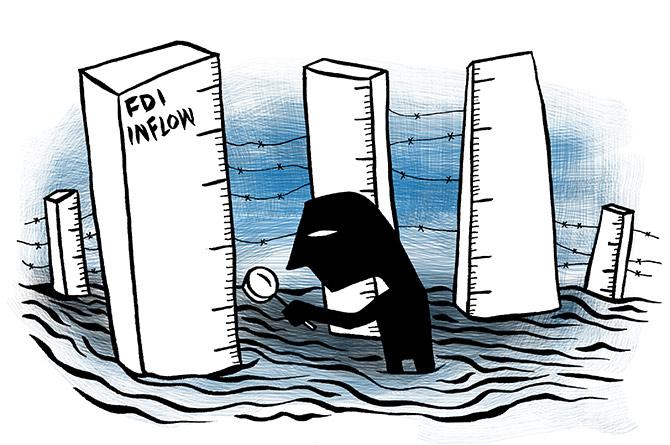Despite all the noise around India’s chance to leverage the China-plus one strategy, India’s share of global foreign direct investment (FDI) inflows fell from 3.5 per cent in the first nine months of 2022 to 2.19 per cent in the same period in 2023, according to OECD data.

The sharp drop of 54 per cent is much steeper than the overall global FDI inflow decline of 26 per cent in the first nine months.
FDI inflows to China have fallen dramatically from a share of 12.5 per cent in the first nine months of 2022 to only 1.7 per cent in the same period in 2023.
It is not India but countries like the US, Canada, Mexico, Brazil, Poland, and Germany which gained the most from China’s loss by seeing their global share rise.
The US is in the top gainer with a 29.4 per cent share of global FDI inflows in the first nine months of CY 2023, up from 24 per cent in the previous year.
This is understandable given the semiconductor and electronics investments that are coming up (such as TSMC’s mega fabrication plants) and the total approved FDI from Taiwan in 2023 of $11. 25 billion.
What has helped are government schemes under the CHIPS Act that have set aside $52 billion for the semiconductor industry in subsidies.
What’s more, the geopolitical tensions between the US and China have drawn many companies from Taiwan and South Korea and other locations to set up manufacturing operations in the US to reduce their dependence on China.
The situation has been summed up by a report by Kotak Institutional Equities: "India is still to see a meaningful pick up in FDI investment despite the China +1 narrative and significant reforms,”
And, on the other hand, the US and a select set of developed markets and emerging markets seem to have benefited from the sharp decline of FDI inflows in China.
Apart from the US, Canada has gained a fair bit.
Its global share of FDI inflows rose from 2.9 per cent to 4.6 per cent in the period under review.
Mexico, which has the advantage of supplying to its big neighbour, has also seen its share go up from 2.8 per cent to 3.6 per cent.
Germany’s share rose to 2 per cent, a sharp rise from 0.4 per cent for the same period.
India has enjoyed some major successes in wooing FDI, especially through its production-linked incentive and semiconductor policies.
The entry of Apple Inc with its vendors has helped to push up mobile exports.
But FDI inflows in an industry, which is essentially an assembly line operation can only be limited, especially as the supply chain is being built.
The government is no doubt hoping that might change.












 © 2025
© 2025